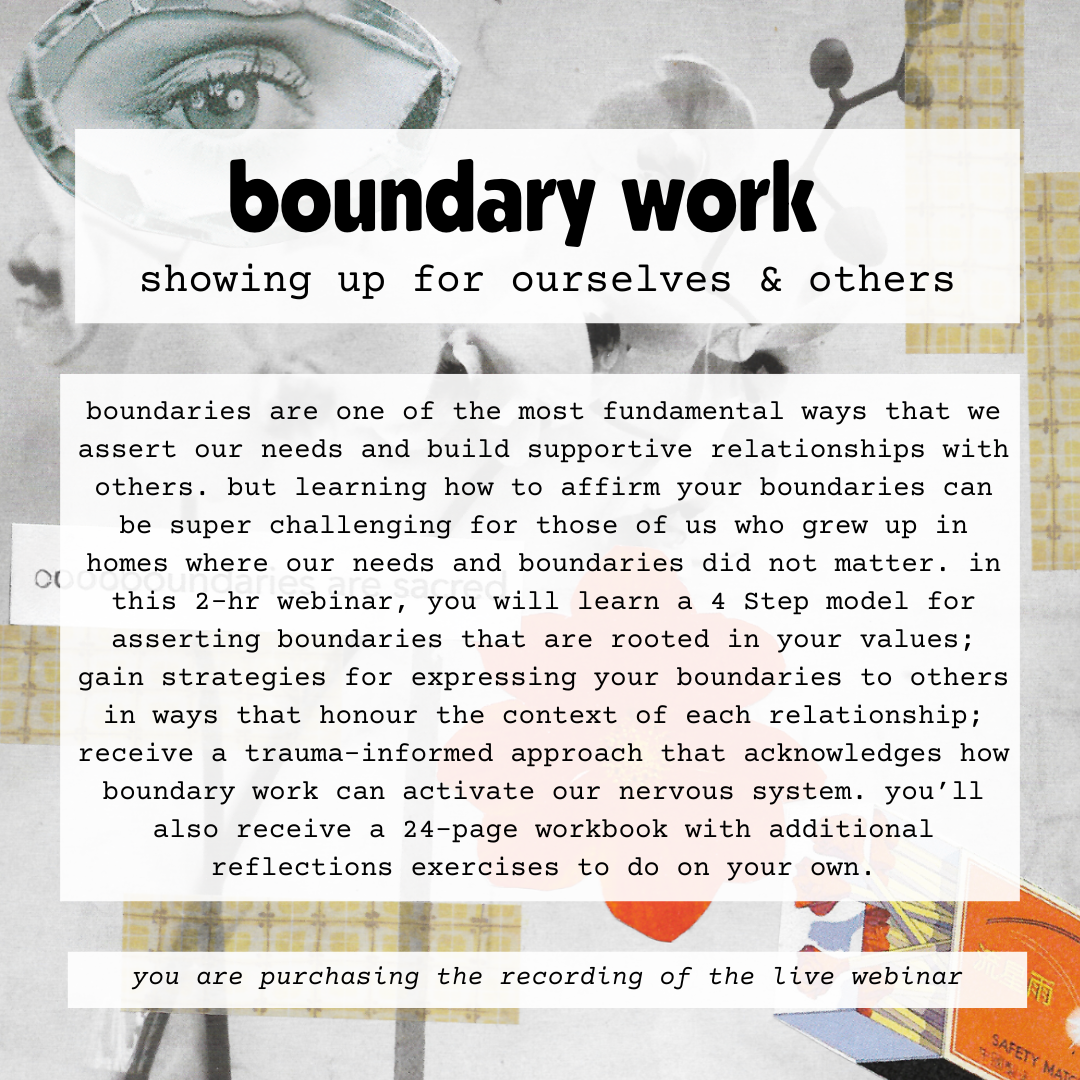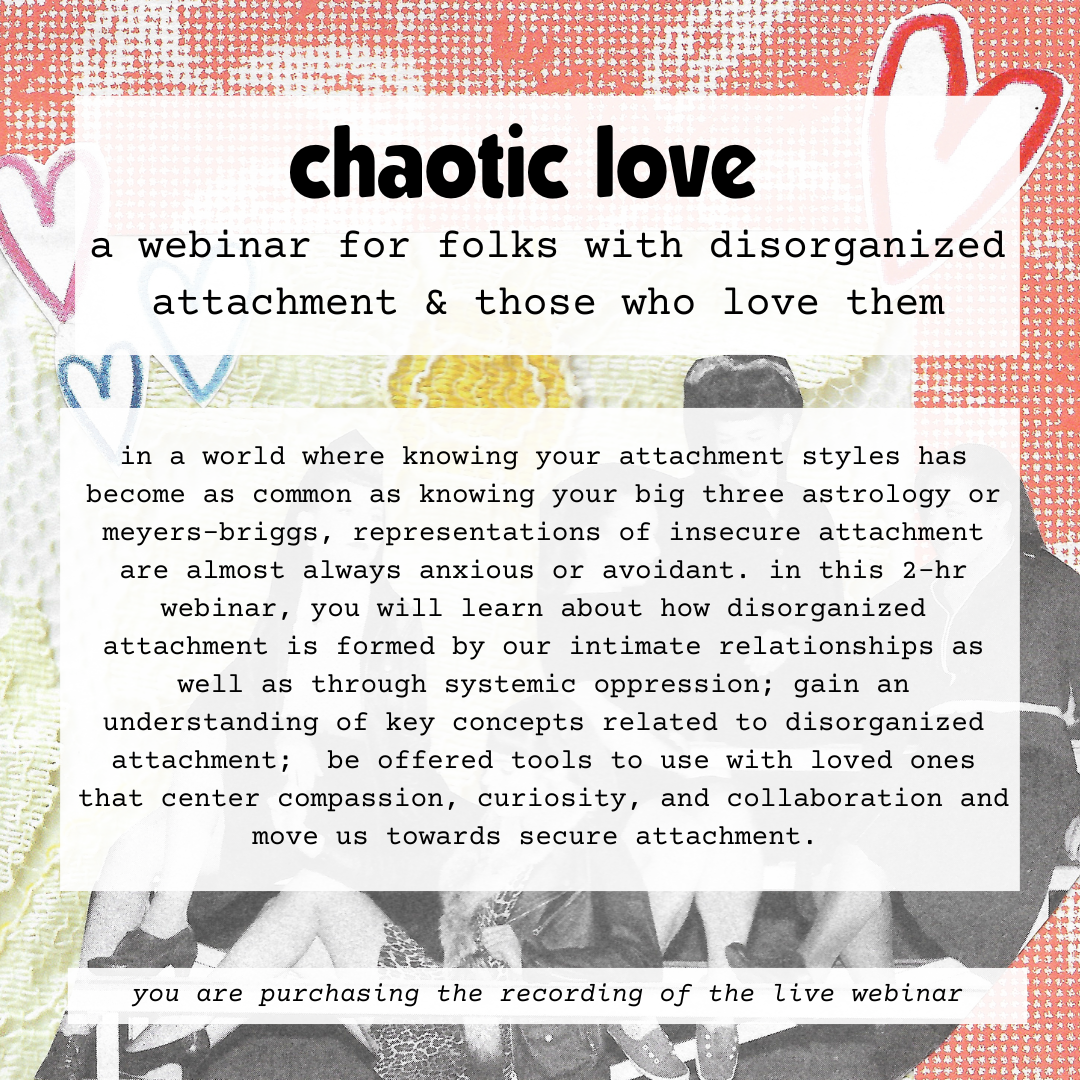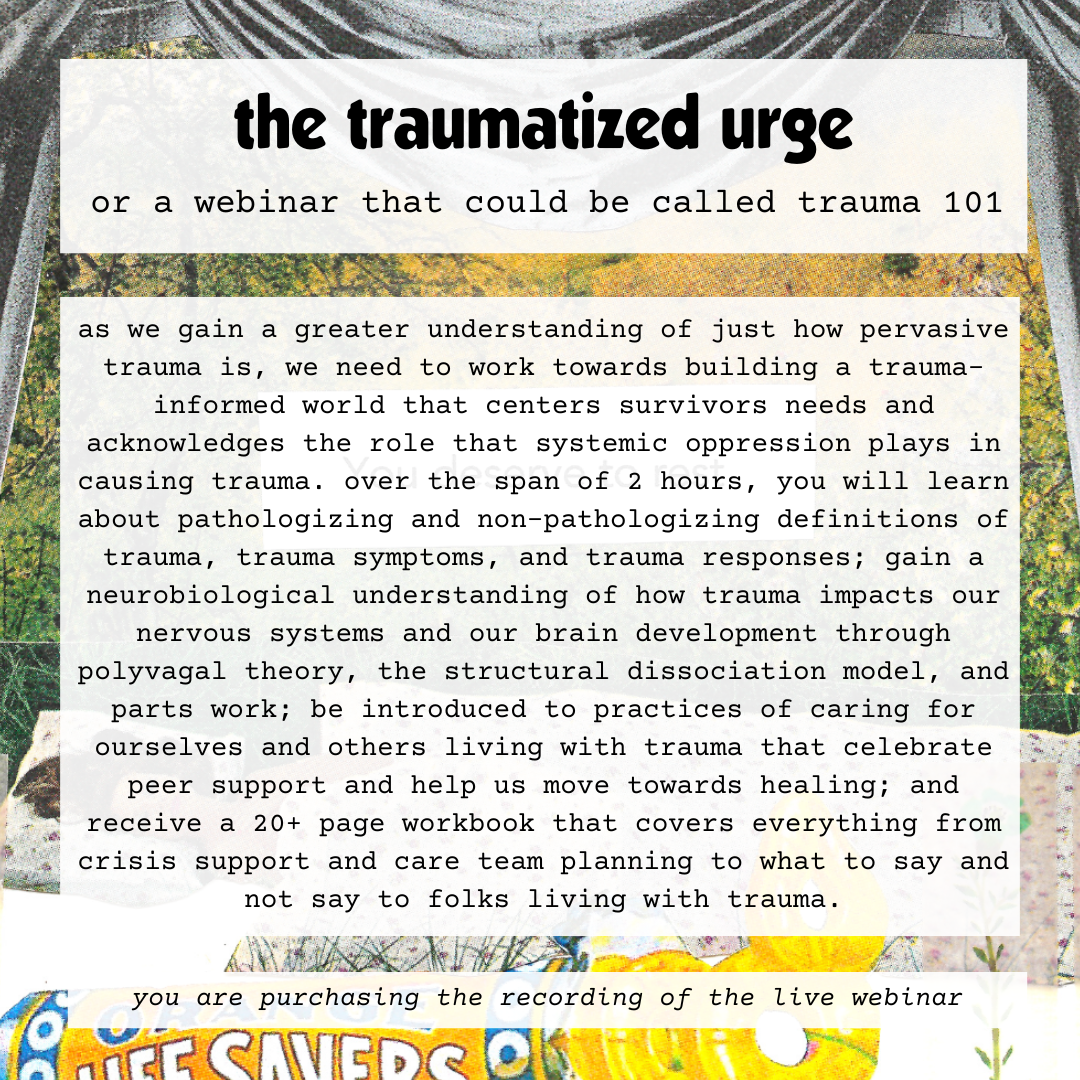 Image 1 of 1
Image 1 of 1


carrying ourselves home (part 2): tending to & befriending our parts
We all have parts that live within us. Sometimes there’s a part of us that wants to go out and a part of us that wants to stay in. For folks living with structural dissociation and complex trauma, these parts are more defined and have played a major role in our survival. When it wasn’t safe to be us, our parts took over to help us make it through another day. When you live in an ongoing state of traumatization and nervous system activation, we spend a lot (if not most) of our time living through our traumatized parts.
Under a pathologizing approach to trauma, we’re taught to disavow those parts, to feel ashamed of all of the ways that they learnt how to survive: from fawning to problematic substance use, from self-harm to suicidal ideation. But change does not occur through shame, criticism, and blame. Change occurs through compassion, curiosity, and collaboration. In order to move towards living a life from our present day adult self, we need to tend to the needs, fears, beliefs, and desires of our parts, and we need to befriend them.
In part 2 of this series, we’ll build on the foundation gained in part 1. You will:
Receive an introduction to polyvagal theory and how to use it in parts work.
Gain a neuroscientific understanding of the importance of compassion, curiosity, and collaboration in parts work and healing more broadly.
Learn about the different roles each part plays in our survival, including their different coping mechanisms and survival resources.
Harness an understanding of each part’s beliefs, fears, needs, and desires to figure out how to tend to each part.
Be introduced to different strategies for befriending and tending to our parts, so that we can move towards collaboration between all of our parts and our adult self.
What this webinar isn't:
A substitute for working with a therapist, though I recognize that trauma-informed therapists are hard to find and therapy isn't accessible for everyone.
A comprehensive overview of all of the elements of parts work healing. If you haven’t taken part 1 of this webinar, you will need to do so before taking part 2, as I will not be going over the foundational elements from part 1, and you’ll need them to follow along.
Along with the 2-hr webinar, you’ll receive a 30 page workbook with 3 additional activities:
Tracking Your Parts
Affirmation Cards
Mapping Your Inner World
Important notes:
You must have completed part 1 in the series, “Getting to Know Our Parts” prior to taking part 2. You can purchase part 1 here.
Webinar is captioned.
You will receive a link to access the workbook shortly after purchased, in which you’ll find the link to watch the recording.
Workshop Cost:
I strive to make my offerings accessible for everyone, regardless of income. I've created a few different sliding scale options with the hopes that those who can contribute more will do so, thus enabling me to offer free/low-cost spots to those who need them.
The costs below are in US dollars.
Level 1: FREE for BIPOC. These spots are reserved for Black, Indigenous, and People of Colour.
Level 2: $30. For those who’re low income, no savings, have minimal expendable income each month, and couldn't otherwise afford to attend without this option. If you are a white person who cannot afford Level 2, please reach out to support@margeauxfeldman.com with the amount you can afford. No one will be turned away for lack of funds.
Level 3: $50. For those who’re low to mid-income, with some money in savings and/or financial support from family; has some expendable income each month.
Level 4: $70. For those who’re mid- to high-income/stably employed, with savings account and financial safety net; can afford to take vacations and make other large purchases with relative ease.
Level 5: $90. For those who’re high income; have benefited from intergenerational wealth; and can make purchases with ease.
Given that the majority of customers are based outside of Canada, the prices are in USD. If you live in Canada and the exchange rate is an access barrier, please reach out to support@margeauxfeldman.com for a discount code.
We all have parts that live within us. Sometimes there’s a part of us that wants to go out and a part of us that wants to stay in. For folks living with structural dissociation and complex trauma, these parts are more defined and have played a major role in our survival. When it wasn’t safe to be us, our parts took over to help us make it through another day. When you live in an ongoing state of traumatization and nervous system activation, we spend a lot (if not most) of our time living through our traumatized parts.
Under a pathologizing approach to trauma, we’re taught to disavow those parts, to feel ashamed of all of the ways that they learnt how to survive: from fawning to problematic substance use, from self-harm to suicidal ideation. But change does not occur through shame, criticism, and blame. Change occurs through compassion, curiosity, and collaboration. In order to move towards living a life from our present day adult self, we need to tend to the needs, fears, beliefs, and desires of our parts, and we need to befriend them.
In part 2 of this series, we’ll build on the foundation gained in part 1. You will:
Receive an introduction to polyvagal theory and how to use it in parts work.
Gain a neuroscientific understanding of the importance of compassion, curiosity, and collaboration in parts work and healing more broadly.
Learn about the different roles each part plays in our survival, including their different coping mechanisms and survival resources.
Harness an understanding of each part’s beliefs, fears, needs, and desires to figure out how to tend to each part.
Be introduced to different strategies for befriending and tending to our parts, so that we can move towards collaboration between all of our parts and our adult self.
What this webinar isn't:
A substitute for working with a therapist, though I recognize that trauma-informed therapists are hard to find and therapy isn't accessible for everyone.
A comprehensive overview of all of the elements of parts work healing. If you haven’t taken part 1 of this webinar, you will need to do so before taking part 2, as I will not be going over the foundational elements from part 1, and you’ll need them to follow along.
Along with the 2-hr webinar, you’ll receive a 30 page workbook with 3 additional activities:
Tracking Your Parts
Affirmation Cards
Mapping Your Inner World
Important notes:
You must have completed part 1 in the series, “Getting to Know Our Parts” prior to taking part 2. You can purchase part 1 here.
Webinar is captioned.
You will receive a link to access the workbook shortly after purchased, in which you’ll find the link to watch the recording.
Workshop Cost:
I strive to make my offerings accessible for everyone, regardless of income. I've created a few different sliding scale options with the hopes that those who can contribute more will do so, thus enabling me to offer free/low-cost spots to those who need them.
The costs below are in US dollars.
Level 1: FREE for BIPOC. These spots are reserved for Black, Indigenous, and People of Colour.
Level 2: $30. For those who’re low income, no savings, have minimal expendable income each month, and couldn't otherwise afford to attend without this option. If you are a white person who cannot afford Level 2, please reach out to support@margeauxfeldman.com with the amount you can afford. No one will be turned away for lack of funds.
Level 3: $50. For those who’re low to mid-income, with some money in savings and/or financial support from family; has some expendable income each month.
Level 4: $70. For those who’re mid- to high-income/stably employed, with savings account and financial safety net; can afford to take vacations and make other large purchases with relative ease.
Level 5: $90. For those who’re high income; have benefited from intergenerational wealth; and can make purchases with ease.
Given that the majority of customers are based outside of Canada, the prices are in USD. If you live in Canada and the exchange rate is an access barrier, please reach out to support@margeauxfeldman.com for a discount code.





